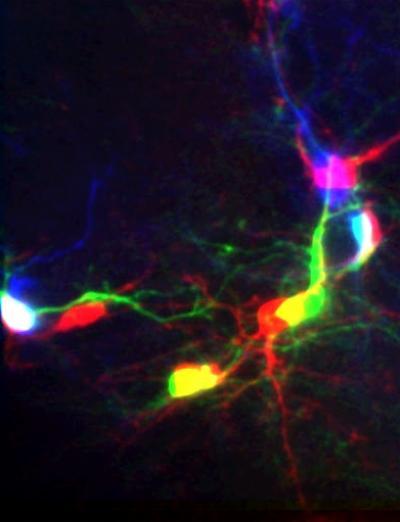All anxiety is not created equal, and a research team at the University of Illinois now has the data to prove it. The team has found compelling evidence that differing patterns of brain activity are associated with each of two types of anxiety: anxious apprehension (verbal rumination, worry) and anxious arousal (intense fear, panic, or both).
Brain
A scientific indicator of how easily distracted you are has been designed by a University College London psychologist. It could be used as another assessment tool during the recruitment process and would have particular benefits in fields where employee distraction could lead to fatal errors.
Communication ability among children who are intellectually disabled or have communication limitations (such as autism, down syndrome, or cerebral palsy) may soon be improved thanks to a research group of the University of Granada.
Northwestern University's Charles Bennett, M.D., is a super sleuth of potentially deadly prescription drug reactions. He leads a national SWAT team of doctors called RADAR (Research on Adverse Drug Events and Reports) based out of Northwestern's Feinberg School of Medicine. They swoop in to investigate early signs of trouble years before the Food and Drug Administration (FDA) takes notice.
Cold Spring Harbor Laboratory (CSHL) researchers have identified a function of neuregulin1 (NRG1), a gene previously linked to schizophrenia but whose role in the disease was unknown. "We found that when this gene or this pathway is impaired," explained CSHL's Bo Li. "It starts a chain reaction negatively impacting synapses in the brain which contribute to the abnormal development of brain circuits and may lead to schizophrenia."
Mice genetically engineered to lack a single enzyme in their brains are more adept at learning than their normal cousins, and are quicker to figure out that their environment has changed, a team led by researchers at UT Southwestern Medical Center has found.
The results, appearing today in the online edition of the journal Nature Neuroscience, reveal a new mechanism of learning in the brain, which might serve in humans as a target for treating disorders such as post-traumatic stress disorder, Alzheimer’s disease or drug addiction, the researchers said.
For the first time anywhere, a researcher at the Hebrew University of Jerusalem has succeeded in observing in vivo the generation of neurons in the brain of a mammal. Magnified photo shows division of neuron in vivo. Credit: (Hebrew University of Jerusalem photo)
Magnified photo shows division of neuron in vivo. Credit: (Hebrew University of Jerusalem photo)
Smokers who have a say in how they quit are more likely to try kicking the habit and are more successful, according to new research at the University of Rochester.
Rochester researcher Dr. Geoffrey Williams associate professor of medicine at the University of Rochester School of Medicine and Dentistry, will unveil new findings at a Toronto conference this month that demonstrate patient involvement in a quit plan leads to smokers who are more motivated to quit because they genuinely want to, not because they are being nagged or bullied.
A new analysis has found that many alcohol treatment studies are designed in ways that inadvertently omit women and African-Americans from participation. The Stanford University School of Medicine researcher who led the effort said the findings should remind all scientists that strict study eligibility criteria can have unintended, negative consequences.
People addicted to alcohol and young adults who are heavy drinkers, but not considered alcoholics, have something in common: they possess poor decision-making skills, according to psychologists at the University of Missouri-Columbia. The findings are based on research examining binge drinking and heavy alcohol use among college students.
Early-stage research has found that a new gene therapy can nearly eliminate arthritis pain, and significantly reduce long-term damage to the affected joints, according to a study published today in the journal Arthritis and Rheumatism.
Craving – defined as a powerful urge to drink, or intense thoughts about alcohol – is an important contributor to the development and maintenance of alcoholism. Recent research suggests that appetite-regulating hormones and peptides may be involved in the neurobiology of alcohol craving. A new study has confirmed that appetite-regulating peptides leptin and ghrelin do indeed influence alcohol craving, but especially among certain subtypes of alcoholics.
Compared to math teachers in the high-achieving nations of Hong Kong and Japan, teachers in the United States offer less of certain supports that could help students learn more. This could contribute to the lower performance among U.S. students on international math tests, a UCI researcher discovered.
At four months, babies can tell whether a speaker has switched to a different language from visual cues alone, according to a University of British Columbia study.
Researcher Whitney Weikum found that infants are able to discern when a different language is spoken by watching the shapes and rhythm of the speaker's mouth and face movements.
If you do something positive for your mate, does it matter why? The answer is yes, according to new research from University of Rochester research assistant professor Heather Patrick. She will unveil a study at a Toronto conference later this month that shows both small sacrifices, like doing the dishes for your partner, and big ones, like moving across the country for a new job he or she really wants, mean more if you do them because you genuinely want to. Or get the kids to do them and make the wife a nice bath
Or get the kids to do them and make the wife a nice bath